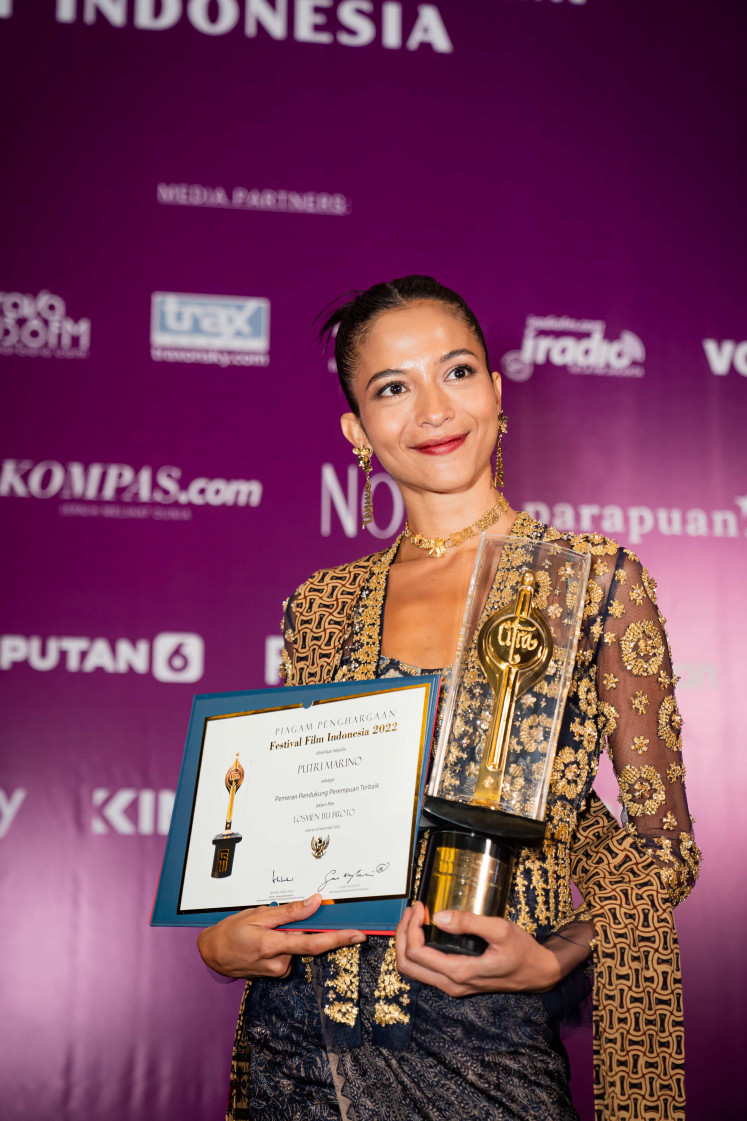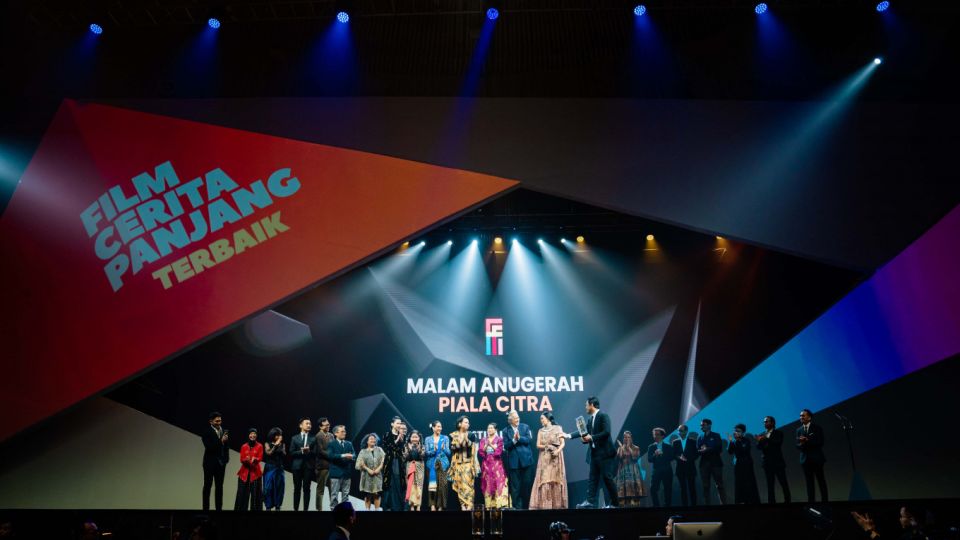November 25, 2022
JAKARTA – The Indonesian Film Festival (FFI) celebrates an inclusive list of winners as the nation echoes similar joy at the country’s film industry achievements this year.
There had seemingly never been such elation surrounding the prestigious night of the Indonesian Film Festival (FFI) than this year. It might have been the post-pandemic glee, or it might have been that the nominees in each category had been celebrated throughout the year.
“To this day, there are 12 Indonesian films that have generated over 1 million viewers and reached an Indonesian film market share of over 61 percent, compared with 48 percent in 2019,” Indonesian actor Reza Rahadian said during the event’s opening speech. He is also the current chairperson of the FFI.
Such numbers, plus the ever-enthusiastic FFI audience online on YouTube, showed that the interest of the Indonesian audience in local films is reaching new highs. But our films not only prosper locally; many of this year’s films, from short to feature length, have been making the rounds internationally, winning awards from one celebrated festival to another.
“Indonesian films are currently on fire,” Ahmad Mahendra, director of the music, film and media division of the Education, Culture, Research and Technology Ministry, said on the red carpet before the event.
“Our films have won a lot of awards overseas, our [local film] sales beat foreign films here, […] the quality of these films is also good, above all,” he added. This quality, in all categories, was apparent in the nominees presented.

Indonesia’s future: The cast and crew of ‘Before, Now & Then (Nana)’ take a picture together on the red carpet after winning the best feature-length film award at the 2022 Festival Film Indonesia (FFI). (Courtesy of FFI) (Courtesy of Festival Film Indonesia/.)
Globally adored, locally beloved With a long list of great Indonesian films from throughout the year, the 42nd edition of the FFI was not short of nominations, ranging from the horror staple Satan’s Slaves 2: Communion, which went on to win two Citra Awards, to the yet-to-be-screened-locally Autobiography, which went on to win best original screenplay.
“This year’s short film nominations are exceptional, so the jury took a long time to decide on the winner,” producer and short film judge Mandy Marahimin said, speaking to the press on the red carpet on Tuesday. The academy lauded a short animation, won by undergraduate thesis project Blackout, a short film, won by Dancing Colors and even a short documentary, won by Gimbal.
The winners also consisted of diverse picks; Putri Marino won the best supporting actress award for her role in Losmen Bu Broto, while Slamet Rahardjo Djarot won best supporting actor in First, Second & Third Love.
“Indonesian films now have a bargaining position [internationally],” Slamet said in his speech on stage, reminding the ministers who were watching live in the venue that the films could compete globally.
The audience, an essential part of the rise in Indonesia’s film industry, also had a say in who won. Aghniny Haque snatched the viewers’ choice award for best female actress in Mencuri Raden Saleh (Stealing Raden Saleh) and the film itself won the best film award according to viewers.
The film, watched by over 2 million viewers, is also critically acclaimed for its well-written screenplay and daring concept in the country’s arid landscape of the heist genre.
“We were hoping that this film would present fresh air for the Indonesian film [industry], and when it was received in such a big way, our gratitude and spirit to make better movies ahead [increased]. It has become a new energy for us at Visinema,” director Angga Dwimas Sasongko said in his speech.

Star-studded night: Senior actor Slamet Rahardjo Djarot pose for a picture backstage after winning the best supporting actor award at the 2022 FFI on Tuesday. (Courtesy of FFI) (Courtesy of Festival Film Indonesia/.)
One of the very few upsets of the night was the zero wins for Ngeri Ngeri Sedap (Missing Home), despite its nationwide love and Oscar consideration for the international film nominees from Indonesia.
The biggest fights and wins of the night eventually came down to two of the most talked about Indonesian films of the last year – locally and internationally – Edwin’s Vengeance Is Mine, All Others Pay Cash, which won the best film award at the Locarno Film Festival in 2021, and Kamila Andini’s Before, Now & Then (Nana), which won the supporting performance by Laura Basuki at this year’s Berlinale. Both of the films won five Citra Awards each.
An adaptation of Eka Kurniawan’s famous novel, Edwin’s Vengeance – a tale of sexual impotence, ’80s Indonesian action films and the country’s political unrest – went on to win the best director award for Edwin and the adapted screenplay award for him and Eka. Both of its leads, Marthino Lio and Ladya Cheryl, also won the best actor and actress awards.
Meanwhile, Kamila Andini’s Before, Now & Then (Nana) – a silent navigation of Raden Nana’s story in 1960’s Bandung – won, among many, the most awaited category: best feature-length film.
“This goes to show that we have a universal language despite our differences,” Kamila Andini told The Jakarta Post when asked about the film’s resonance in the country and abroad. “Cinema or visual language is a universal language, so wherever we are in the world, we can feel whatever conflict or issue is happening on-screen. [It] is a clear language to unite differences.”
Women’s lives and stories
With the theme of Perempuan: Citra, Karya & Karsa (Women: Image, Creation & Power), this year’s FFI seemingly fit the female-dominated nominations. It was no secret that women created and starred in Indonesia’s biggest films this year.
This spirit was best expressed in Happy Salma’s monologue early in the ceremony. She embodied the female character Patmah in the 1951 Indonesian film Sedap Malam (Sweetness of the Night).
“I remember someone said in a magazine that I didn’t look like I was suffering enough; I was too fancy and looked flat. I was confused; are women not allowed to look strong in their suffering?” Happy said, voicing out Patmah’s concern.
Sedap Malam, directed by the first Indonesian female director Ratna Asmara, talked about the Indonesian women post-revolution and their struggle in dealing with prostitution. Despite the film’s revolutionary feat, it is well documented that Ratna received very little support from her male counterparts. Other Indonesian female directors blossomed at the turn of the century.
“I imagine, years later, in a shining future, there will be many other women with the same glowing eyes as Ratna’s, who will be not only directors but also producers, artistic directors, editors, screenwriters!” she expressed.
That future, the FFI showed, is here and now, with the background of Happy’s performance showing many female figures in the current Indonesian film industry, and the female artistic directors, makeup artists and fashion designers who went on to win on Tuesday like Eba Sheba and Gemailla Gea Geriantiana.
Happy closed the monologue with Chairil Anwar’s line in his poem: “Semua dapat tempat, semua harus dicatat [everyone gets a place, and everyone must be recorded]”. And the award event did that, too – established journalist Najwa Shihab presented the lifetime achievement award to the late prominent actress Rima Melati, who appeared in nearly 100 Indonesian films during her lifetime.

Back-to-back wins: Indonesian actress Putri Marino, who won the best actress award in 2017 for ‘Posesif’, wins the best supporting actress for her role in ‘Losmen Bu Broto’ at the 2022 FFI on Tuesday. (Courtesy of FFI) (Courtesy of Festival Film Indonesia/.)
Many women also got their deserving place in the pantheon of winners, including the film criticism winner Erina Adeline Tandian, for her video essay on YouTube titled Women as Illusions: The Sexual Politics in the film Love for Sale.
“I want to thank FFI 2022 for giving us film critics and researchers a space in this event because a film doesn’t stop when it’s been watched or distributed; it can still move in the form of writing, or non-written pieces in this new era of media,” she said in her speech.
“Hopefully this becomes the motivation for future filmmakers, especially women,” artistic director Vida Sylvia said to the press after winning the award for her work in Nana.
“Be motivated, and be more confident that there are now more and bigger opportunities for Indonesian female filmmakers to hold this!” Vida closed, raising her own Citra Award in her hand.


